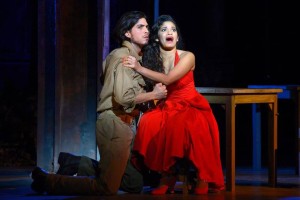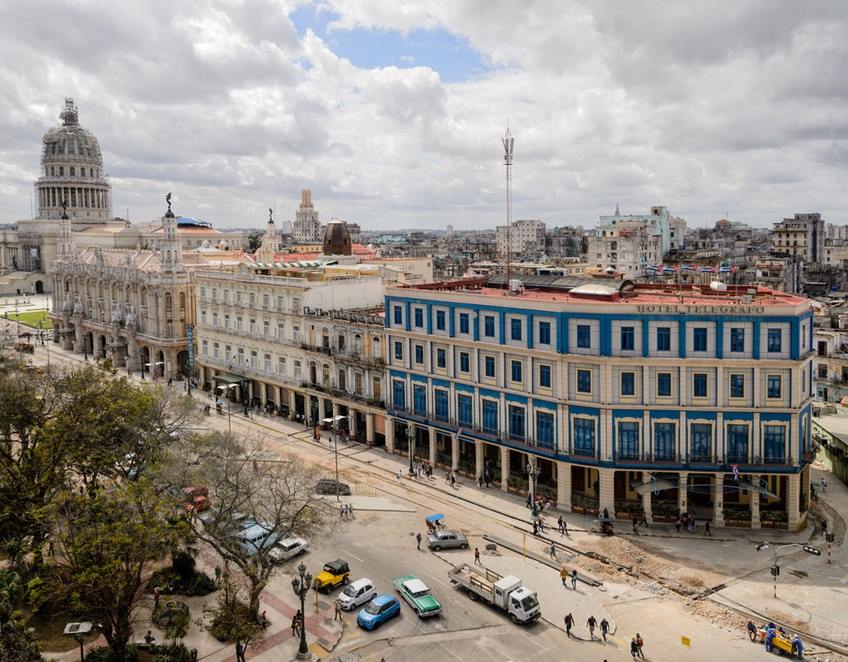MUSICAL “CARMEN THE CUBAN” CONQUEST PARIS.
The play is set in the late 1950s during the decline of the dictatorship of Fulgencio Batista and before installation of Fidel Castro. The work now takes special relevance for the winds of change blow again on the island.

Is actress Carmen (Luna Manzanares) (der.), a worker in a cigar factory, in eastern Cuba, and her boyfriend Joseph (Joel Prieto) is a soldier Cambric. BERTRAND GUAY AFP / Getty Images
While Cuba rapid changes lives, inspired by Bizet’s Carmen music played by Cuban artists releases the electrifying variety of rhythms of the Caribbean island in Paris.
For the world premiere of “Carmen, Cuban” at the Theatre du Chatelet, on the banks of the Seine, 16 dancers, 13 musicians and a cast of actor-singers of Cuba and the United States display their art to the glory of the three major specialties Cuban: “live, love and dance.”
“Cuba was always fashionable because it is an island blessed by the gods, for his energy and the geographical position,” he told AFP minutes before the last trial ROCLAN Gonzalez choreographer.
Although it is set in the late 1950s during the decline of the dictatorship of Fulgencio Batista and before installation of Fidel Castro, the work takes on special relevance by the winds of change blow again on the island.
The romantic opera by Georges Bizet (1838-1875) based on a libretto by Prosper Merimé originally set in Spain has inspired thousands of variants, from the African American Oscar Hammerstein II musical “Carmen Jones” (1943) and Otto Preminger version Holly- the Flemish film by Carlos Saura (1983).
This time the British director Christopher Renshaw –cuatro Tony Awards in 1996 for his “King and I” and successful author of the musical “We will rock you” on the Queen– band traveled to Havana for inspiration.
In 2014 he held auditions with dozens of Cuban artists, selecting dancers, musicians and three singers. The rest of the cast came from Broadway-mostly Cubans in the United States– installed where the British want to ride if successful musical in Paris (until April 30) and submit it in 2017 in Germany and England.
This Carmen (Luna Manzanares) is also working in a cigar factory, but in eastern Cuba, and her boyfriend Joseph (Joel Prieto) is a soldier of Batista. The bullfighter in Bizet’s opera is qui “El Niño” (Joaquin Garcia), a successful boxer who steals the love of the habanera.
“If I loved you, would your end!” He sings in a lewd chachachá the Cuban soldier tormented the irresistible Carmen Jones, the daughter of an American soldier and a prostitute.
The orchestration and musical arrangements by Alex Lecamoire parents adapt cubanos– –neoyorquino of leading cadres of the original work to Cuban music, the music ends up being a kind of encyclopedia.
“I was fascinated by trying to transform the idea (Carmen) to a Latin atmosphere and arrange music with mambo, salsa and cha-cha,” said Renshaw.
Cuba is a country full of rhythms –tiene 22 diferentes– and the idea was to leave no one out alone.
Santeria is also present, through the character of an old woman who reappears several times as an element of fate that echoes the fate of the Roma in the work of Bizet.
British director said he felt the urgent need for the musical “because the Cuban culture was preserved in time, is one of the best preserved –for better or worse, since by the revolution was not as destroyed by the globalization “.
Agencies / AFP / Luis Torres de la Llosa / Excerpts/ Internet Photos / YouTube.
THE CUBAN HISTORY, HOLLYWOOD.
Arnoldo Varona, Editor.
MUSICAL “CARMEN LA CUBANA” CONQUISTA A PARÍS.
La obra está ambientada a fines de los años 1950 durante el ocaso de la dictadura de Fulgencio Batista y antes de la instalación de la de Fidel Castro. La obra toma ahora especial relevancia por los vientos de cambio que vuelven a soplar en la isla.

Carmen es la actriz (Luna Manzanares) (der.), una obrera en una fábrica de puros, en el oriente de Cuba, y su enamorado José (Joel Prieto) es un soldado de Batista. BERTRAND GUAY AFP/Getty Images
Mientras Cuba vive cambios vertiginosos, un musical inspirado en Carmen de Bizet interpretado por artistas cubanos libera en París la electrizante variedad de ritmos de la isla caribeña.
Para el estreno mundial de “Carmen, la cubana” en el Teatro del Chatelet, a orillas del Sena, 16 bailarines, 13 músicos y un elenco de actores-cantantes de Cuba y Estados Unidos despliegan su arte a la gloria de las tres grandes especialidades cubanas: “vivir, amar y bailar”.
“Cuba siempre estuvo de moda, porque es una isla bendecida por los dioses, por su energía y por la posición geográfica”, dijo a la AFP minutos antes del último ensayo el coreógrafo Roclán González.
Aunque está ambientada a fines de los años 1950 durante el ocaso de la dictadura de Fulgencio Batista y antes de la instalación de la de Fidel Castro, la obra toma especial relevancia por los vientos de cambio que vuelven a soplar en la isla.
La ópera romántica de Georges Bizet (1838-1875) basada en un libreto de Prosper Merimé originalmente ambientado en España ha inspirado miles de variantes, desde el musical afroamericano de Oscar Hammerstein II “Carmen Jones” (1943) y su version hollywoodiana de Otto Preminger a la cinta flamenca de Carlos Saura (1983).
Esta vez el director británico Christopher Renshaw –cuatro premios Tony en 1996 por su “King and I” y exitoso autor del musical “We will rock you” sobre la banda Queen– viajó a La Habana para inspirarse.
En el 2014 realizó audiciones con decenas de artistas cubanos, seleccionando a los bailarines, músicos y tres cantantes. El resto del elenco provino de Broadway –principalmente cubanos instalados en Estados Unidos– donde el británico quiere montar el musical si tiene éxito en París (hasta el 30 de abril) y presentarlo en el 2017 en Alemania e Inglaterra.
Esta Carmen (Luna Manzanares) también es obrera en una fábrica de puros, pero en el oriente de Cuba, y su enamorado José (Joel Prieto) es un soldado de Batista. El torero en la ópera de Bizet es quí “El Niño” (Joaquín García), un boxeador exitoso que le roba el amor de la habanera.
“¡Si yo te amara, sería tu final!”, canta en un lascivo chachachá al atormentado soldado cubano la irresistible Carmen Jones, hija de un militar norteamericano y una prostituta.
La orquestación y arreglos musicales de Alex Lecamoire –neoyorquino de padres cubanos– adaptan los principales cuadros de la obra original a la música cubana, de la que el musical termina siendo una especie de enciclopedia.
“Me fascinaba tratar de transformar la idea (de Carmen) a un ambiente latino y arreglar la música con mambo, salsa y chachachá”, explicó Renshaw.
Cuba es un país lleno de ritmos –tiene 22 diferentes– y la idea era no dejar ni uno solo afuera.
También está presente la santería, a través del personaje de una anciana que reaparece varias veces como un elemento del destino que hace eco al de la fatalidad gitana en la obra de Bizet.
El director británico explicó que sintió la necesidad imperiosa de realizar el musical “porque la cultura cubana quedó conservada en el tiempo, es una de las mejor preservadas –para bien o para mal, desde la Revolución– ya que no fue destruída por la globalización”.
Agencies/AFP/Luis Torres de la Llosa/InternetPhotos/YouTube.
THE CUBAN HISTORY, HOLLYWOOD.
Arnoldo Varona, Editor.



